
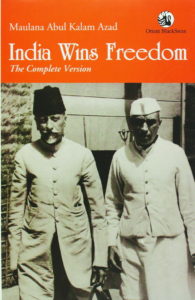
India Wins Freedom: The Complete Version
Maulana Abul Kalam Azad
Vanguard Books
One of the makers of modern India tells the story of the partition of India as never before, with intimate knowledge and feeling. India Wins Freedom has at last won its own freedom. The full text of this autobiographical narrative was confined, under seal, in the National Library, Calcutta, and in the National Archives, New Delhi, for thirty years. What we now have is the complete text, released in September 1988, by a court directive. Not only have all the words and phrases of the original been reproduced, the original tone and temper have been fully restored. The text now reveals that the controversy that has simmered for so long about the hitherto unpublished pages, was fully justified.
Maulana Azad was an Indian scholar, activist and a senior leader of the Indian National Congress during the Indian independence movement.
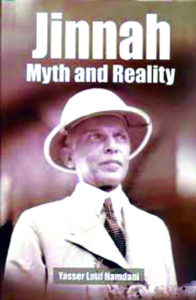
Jinnah: Myth and Reality
Yasser Latif Hamdani
Vanguard Books (2012)
This book is not a biography, it is the author’s view of why Jinnah hailed as the best ambassador of Hindu-Muslim Unity ended up making a separate state in the subcontinent and what his views were on the future shape of Pakistan. Was Pakistan going to be a democratic state? What would be the role of religion in Pakistan? Was Pakistan the consequence of a millennial in stone or was it merely a counter-argument? The author attempts to answer these questions in the present work.
Yasser Latif Hamdani is a practicing lawyer based in Lahore. He studied economics and political science at Rutgers University in New Jersey, USA.
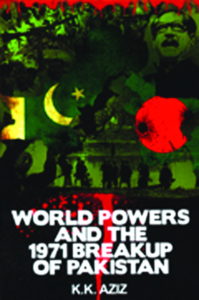
World powers and the 1971 breakup of Pakistan
K.K. Aziz
Vanguard Books (2016)
Most people have a vague idea that in the months leading to the 1971 breakup of Pakistan and during the savage military action in East Pakistan all the major world powers (except China, which couldn’t do anything) were severely critical of Pakistan’s policies and decisions. For the first time, this book chronicles and records this hostility precisely, punctiliously and extensively.
For this purpose Professor Aziz has consulted an incredibly enormous range of source material: 152 newspapers and magazines, 155 journal articles, 133 books, and several unpublished radio and TV broadcast transcripts.
The focus is on the United States, the United Kingdom and the USSR, with a brief look at the rest of the world. A detailed chapter de-scribes the making and implications of the lethal Indo-Soviet Treaty. The brief but explosive prologue is a novel and damaging expose of the unpardonable mistakes made by the All India Muslim League leadership between 1906 and 1947 which, irrevocably and inevitably, led to the creation of Bangladesh. This investigation is based on original and contemporary documents. To put the foreign comments in their context, the more relevant portions of the Hamood-ur-Rahman Commission Report are reproduced in an appendix.
This book is a register of events, a narrative of public opinion and an account of how the world powers saw and judged the developments of 1970-71. It is a collection of stark and brutal facts and comments upon them. It is not a work of analysis or judgment because Pakistani scholars are denied the freedom of expression essential for that exercise.
As most of the material used here is available in Pakistan but not all of it at one place anywhere, this volume is a valuable and indispensable source book for any study of the 1971 disaster.
K.K. Aziz has taught poetics, history, Islam and Asian studies for 50 years at various institutions. In Pakistan, he has served as deputy official historian to the federal government, chairman of the National Commission on Cultural Research, and Special Policy Advisor to the Prime Minister. In 1997, he was elected to the coveted Aziz Ahmad Memorial lectureship at the University of Toronto. Author of 32 scholarly works, he commands an international reputation as a political scientist, historian and general lecturer.
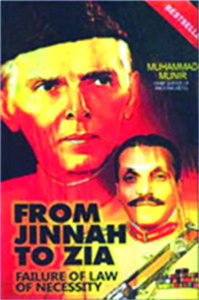
From Jinnah to Zia: Failure of Law
Muhammad Munir
Vanguard Books (2017)
This book does not claim to be a history of Pakistan. Its less ambitious format is defined as being a part of that history namely - the ideological and geographical changes in Pakistan.
The author maintains that the Quaid-i-Azam never used the words “ideology of Pakistan” laying emphasis on Quaid’s speech of August 11, 1947, to prove that the pattern of government which the Quaid-i-Azam had in mind was a secular, democratic government. The scene, however, changed with Liaqat Ali Khan’s objective resolution, which the author contrast with the Quaid’s vision of the Pakistani Polity, pointing out five points of difference involving question of sovereignty and the existence religious minorities in Pakistan.
Munir points out how the taxation system of the early days of Islam cannot be adopted in TOTO and its original form to cope with the needs of a modern state. The view that everything is possible provided it is not contrary to the Quran and Sunnah alone can save these taxes, because in the Quran and Hadis there is nothing against most of them. But in that case you will have to say goodbye to the claim that Niazam-i-Mustafa or Quran and Sunnah provide solutions of everything under the sun...
Muhammad Munir is a former chief justice of Pakistan.
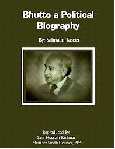
Bhutto: A Political Biography
Salmaan Taseer
Vanguard Books (2019)
Zulfiqar Ali Bhutto came from a wealth family of feudal landowners in Sindh. Although westernized by education in the United States and in England, he became the champion of the Third World when he was appointed the youngest Foreign Minister in Asia in 1962.
Disillusioned with his one-time mentor, President Ayub Khan, he orchestrated civilian demonstrations which toppled him from power. A skillful and sophisticated politician, he nevertheless failed to prevent (and some say le even provoked) the bloodbath which led to the secession of Bangladesh.
He assumed power in the aftermath of the debacle, and swept the general elections in West Pakistan with a slogan of ‘iroti kapara makan’ ‘food, clothes and shelter’. Bhutto’s regime, which began with so much promise, eventually fell to an army coup amid charges of violence and oppression. His trail, which lasted nearly two years, caused world-wide sensation. In spite of pleas for clemency from many heads of state, he was hanged on 4 April 1979.
His courage in the face of death made him a martyr whose shadow will fall on the politics of Pakistan for years of come. Salmaan Taseer’s political biography provides unique insight into this dramatic career and into the political structure of Pakistan. The author interviewed Bhutto on several occasions and reveals hitherto unknown facts about his rise and fall, and provides an ac-count of intrigue, feudalism, populism and religion which is highly relevant to what is happening in Pakistan today.
Salmaan Taseer was born in Simla in 1944. His father was Dr MD Taseer, an eminent educationalist, scholar, writer and poet. Faiz Ahmed Faiz, the celebrated poet and Lenin Peace Prize winner, is his uncle. He was educated in Lahore, at St Anthony’s High School and Government College, after which he qualified in England as a Chartered Accountant. Journalism and politics, however, remain his first love. He was the Pakistan correspondent of the Far Eastern Economic Review and a stringer for the London Economist. In 1969 he was the Treasurer of the PPP in Karachi and one of its earlier members. In 1972 he helped to bring out the weekly Outlook, which was suppressed by Bhutto for outspoken criticism of his regime.

